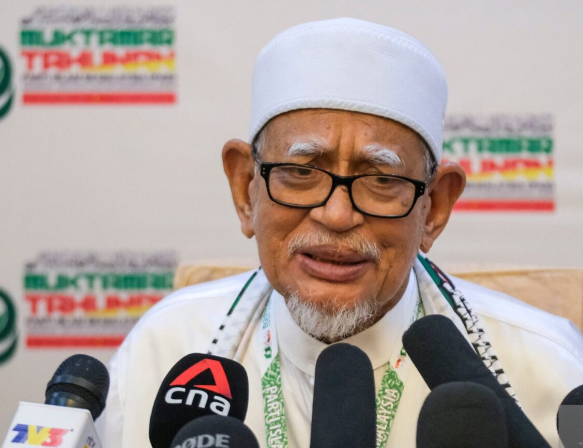PAS President Abdul Hadi Awang Under Investigation for Sedition Over Facebook Post
10 Mar 2024 • 7:30 PM MYT
Zulaikha Farhana
A versatile freelancer, blogger, and content writer

Credit: scoop.my
PAS President Tan Sri Abdul Hadi Awang is under investigation for sedition following his "Ketinggian Islam Wajib Dipertahankan" statement on Facebook on February 20. According to the Chief of Police, Tan Sri Razarudin Husain, the investigation is being conducted under Section 4(1) of the Sedition Act and the Communications and Multimedia Act 1998.
Due to his health condition, the police have not yet spoken to Hadi and are waiting for the right time to summon him for a statement. This is not the first time Hadi has faced such investigations. Last year in August, he was investigated for disputing the Pardons Board's authority during a political talk at PAS' Bakri headquarters in Johor.
During that incident, Hadi allegedly criticized the process of granting pardons in Malaysia, stating that it contradicted Islamic teachings. He also expressed PAS' desire for the current law to be replaced with one that aligns more with Islamic values.
Under Section 4(1) of the Sedition Act 1948, individuals found guilty could face a fine of up to RM5,000, imprisonment for a maximum of three years, or both. Despite the potential consequences, Hadi has stated that he is prepared to face any punishment, stating, "I am ready to be punished. I'm not sure if the punishment is a jail term or a fine, but I would rather go to jail."
In his latest statement, Hadi reaffirmed his commitment to defending the principles of Islam, emphasizing the importance of upholding Islamic values in Malaysia's legal framework. He reiterated his willingness to accept any consequences for his actions, emphasizing his readiness to endure imprisonment if necessary.
The investigation into Hadi's statement reflects the ongoing tension between religious principles and legal statutes in Malaysia. Hadi's remarks have sparked debate about the role of Islamic teachings in shaping the country's laws and the boundaries of free speech.
As the investigation unfolds, many are closely watching how the authorities will handle the case and whether it will lead to further legal action against Hadi. His steadfast stance on the issue has earned him both support and criticism, highlighting the complexities of religious and legal matters in Malaysia's diverse society.
As the investigation progresses, the case of Abdul Hadi Awang raises important questions about the balance between freedom of speech and the respect for religious sensitivities in Malaysia. Hadi's statements reflect his deep-seated convictions about the primacy of Islamic principles, while critics argue that such views could potentially undermine the country's secular legal framework.
The outcome of this investigation could have significant implications for the future of religious and political discourse in Malaysia. It may also influence the ongoing debate about the relationship between Islam and the state, as well as the extent to which Islamic principles should inform Malaysia's legal system.
Regardless of the outcome, Abdul Hadi Awang's case highlights the complex interplay between religion, politics, and the law in Malaysia, and underscores the importance of navigating these issues with sensitivity and respect for the country's diverse cultural and religious landscape.
As the investigation into Abdul Hadi Awang's statements continues, it underscores the need for constructive dialogue and mutual understanding among Malaysia's diverse communities. The case serves as a reminder of the importance of respecting different perspectives and finding common ground to address complex issues.
In the midst of this investigation, it is crucial for all parties to uphold the principles of justice, fairness, and the rule of law. Resolving such matters in a transparent and respectful manner is essential for fostering a harmonious society where individuals can freely express their views while respecting the rights and beliefs of others.
Ultimately, how Malaysia navigates the intersection of religion, politics, and the law will shape its future trajectory. It is a delicate balance that requires careful consideration and an inclusive approach that takes into account the voices and aspirations of all Malaysians.
No comments:
Post a Comment